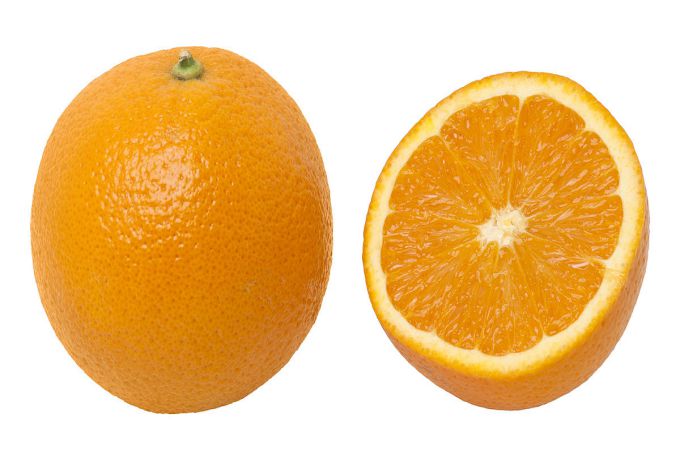Dogs are not always all about the meat. Some are also crazy about fruits. Several known healthy fruits for dogs include bananas, apples, and blueberries. You might also see these fruits as ingredients in some dog foods and treats.
These fruits promote better health for dogs. Likewise, these can also become a favorite snack because of their delicious and sweet flavors. Nevertheless, not every fruit is safe for dogs to eat. Several dangerous foods for dogs like macadamia nuts and grapes can be poisonous to your dog. So, can dogs eat oranges? The answer is simple, and dogs can eat oranges. The sweetness isn’t a problem as natural sugars with fiber are very safe.
In terms of how much of an orange your dog must eat, experts suggest that smaller dogs have between ¼-1/3 of a moderate-sized orange and bigger dogs may eat an entire one. There isn’t really a limit on how much vitamin C a dog can have for the reason that it’s water-soluble and the excess levels are urinated out and do not accumulate in the body.
Are Oranges Good for Your Dogs? – Know the Truth!
Most of you know that oranges are safe for dogs, yet are they good for your dog? Also, is there any benefit you can get from feeding oranges to your pets? Well, the primary nutrient found in oranges is vitamin C or ascorbic acid. This antioxidant helps in healing wounds and protects one’s body from an illness or disease, making it an essential nutrient for human beings.
According to a study, dogs don’t need exogenous vitamin C, which just means that they do not need some vitamin C supplements to be healthy. Healthy dogs that are fed with a balanced, regular diet do just fine without taking any additional vitamins. Still, there are instances when giving an extra dose of vitamin C can help prevent liver damage. More so, pets develop enhanced stability to some nutrients. This is especially true when the dogs exert themselves through a lot of exercises that may halt the liver’s ability to create vitamin C. In essence, there aren’t any health benefits associated with dogs eating orange fruit. Nevertheless, vitamin C oranges offer limited support for several dogs on various occasions.
Can Dogs Eat Orange Peels? – Find Out If Orange Peels Are Safe!
Seeds and peels may also cause some issues for dogs. The owners should get rid of these before giving them orange as a treat. While they aren’t toxic to dogs, seeds and peels are much harder to digest compared to the orange’s soft insides. This may lead to upset stomachs.
While most dogs can eat oranges without any problem, some dogs may experience an upset stomach from eating the orange’s soft parts. They won’t likely suffer from any long-term consequences, yet the dog might be uncomfortable until the orange is out of their body system. Thus, it is best to give your small dog oranges until you’re sure that his body can tolerate it. As with any particular food, once you notice your dog behaving strangely after eating orange peels, stop feeding him immediately.
Give Your Pets Oranges in Moderation
Oranges are actually excellent for the majority of dogs to eat, yet they can be unhealthy in several ways. AKC warns dog owners that while citrus fruits are low in sodium, these have a high content of natural sugars. Therefore, oranges aren’t the best treats for dogs that are overweight.
For starters, you can give your dog one or two sections of oranges. It will help avoid an upset stomach or overeating while you observe its effect on their body. After knowing that your dog can eat oranges without having an upset stomach, it’s safe to feed your dog a bit more.
You have to take note that bigger dogs like Labradors must eat one whole orange per day and small dogs must stick to eating no more than a third of an orange every day. However, it is best to stick to 1 o 2 sections of oranges for all dogs, regardless of its size.
Veterinarians recommend up to 2 pieces of orange daily. Accordingly, oranges, along with some treats, must not make up more than ten percent of your dog’s daily calories.
The truth is, dogs should not be given large quantities of fruits, including oranges. You must ration the portions to avoid potential digestive problems. Oranges are really healthy and contain valuable minerals and vitamins. They are high in vitamin C, potassium, thiamine, and folate. However, this fruit’s acidic nature is not naturally suitable for dogs. Orange juice may cause diarrhea. You might want to exclude this, even if some dogs may handle a fair amount of oranges.
Orange Juice: Are They Healthy for Dogs as they as they Are For You?
Since dogs do not require vitamin C supplements, they do not have to drink orange juice or eat oranges to be healthy. However, if your dog has a hankering for an occasional taste of citrus, it is better to offer an orange fruit to them. Most store-bought orange juice contains added artificial sugars. Your dog might love to drink it up, and it may lead to several health problems, including obesity. It’s best to give your dog lots of water and save orange juices for your breakfast table.
Mandarin Oranges: Are they safe for canines too?
The answer to this question is yes. Like the typical oranges, mandarin oranges pose no threat to dogs unless a dog is suffering from diabetes. The sugar in mandarin oranges can be a health problem for diabetic dogs, so avoid feeding these. While humans require vitamin C to improve their immune system and prevent scurvy, dogs do not need mandarin oranges’ nutrients. When it comes to a nutritional standpoint, mandarin oranges are empty calories for your dog. A big amount of citrus fruits might cause your dog to have diarrhea, yet there is nothing toxic to any dog in these fruits.
Oranges for Puppies: Is it safe and good for them?
Vitamin C is basically an essential nutrient for dog owners, so you might have imagined that your pet could also reap some of these benefits from biting an orange. According to experts, in several dogs, extreme stress or exercise can overwhelm the liver’s capacity to create vitamin C. In such cases, it might be advantageous to give additional supplementation of vitamin C. Nevertheless, for the majority of dogs or puppies, it isn’t actually required.
The nutrients in the oranges can have a good effect on your pet’s immune system. In addition to that, a dose of vitamin C can be advantageous for dogs once they ingest toxic substances such as propylene glycol, onion powder, and some oxidative toxins.
Health Hazards: Things to Remember When Giving Oranges to Your Dog
Dog owners must remember that additional sugars and calories are found in the oranges. More so, these things may not be suitable for your pet’s daily diet. Oranges may affect the diabetic dog’s blood values more because of vitamin C compared to sugar levels, and it would be a good idea to avoid these.
Aside from the actual orange fruit portion, the outer rind has a big amount of vitamin C and additional minerals and vitamins in a concentrated form. However, giving dogs some orange rinds isn’t recommended. They are hard for a dog’s digestive system to break down and might cause gastrointestinal upset. Dog owners must also ensure to cut out seeds before feeding an orange slice to their dogs.
Almost all dogs on balanced and complete diets don’t need mineral or vitamin supplementation from fruits. However, if your dog cannot resist the sweet and juicy citrus, in many cases, sharing some slices will serve as a tasty treat option and get you grateful kisses in return.
Citrus Oil Toxicity: Symptoms to Lookout for in your Dogs
D-limonene and linalool are commonly referred to as citrus oil. You may find citrus oil in the aromatherapy products, the orange trees, and the orange’s skin. The citrus oil is considered as the most potent form of d-limonene and linalool, and this must be kept away from the pets entirely. If you are using aromatherapy products, try to double-check the ingredients and make sure that they don’t contact your dogs. Some products might contain citrus oil, and these include the following:
- Herbal remedies
- Food flavorings
- Flea shampoos
- Perfumes
- Shampoos
- Potpourri
If a dog ingested citrus oil, this could be fatal. The citrus oil toxicity symptoms in dogs are as follows:
- Redness on lips, gums, or tongue
- Pawing at the mouth or face
- Muscle tremors
- Walking difficulties
- Dermatitis
- Hypothermia
- Trembling
- Depression
- Low blood pressure
- Lethargy
- Drooling
- Weakness
- Diarrhea
- Vomiting
If you think your dog has ingested some citrus oil, contact the nearest vet as soon as possible.
Oranges are rich in Vitamin C but Bad for Diabetic Dogs
Dogs that eat oranges will benefit from having a strengthened immune system. Vitamin C is basically a powerful nutrient and this is definitely problematic if your dog is not producing enough. Even if it is hard to know, dogs should only consume fruits in moderation in these cases. Consider balancing your dog’s diet by including small pieces of oranges and watch for any signs of stomach upset. Dogs that have diabetes, on the contrary, must not be given foods that might affect the level of blood sugar negatively. Oranges must be avoided in such cases.
Pitch Perfect: The Pith Part of Oranges is Perfect for Dogs
A lot of people do not enjoy the orange’s pith part; on the other hand, it is perfect for canines. The whitish, stringy, web-like, and fibrous healthy food is basically a pet-friendly part of oranges. Therefore, if you are eating some oranges, you can share this part with your dog. It is perfect for your cute pet. However, in terms of peel or outer rind, get rid of it because it’s poorly digested and often not recommended.
Fruity Alternatives: What Other Fruits Can You Give Your Dogs?
If you like to swap over your dog’s snacks for a healthier option, giving him some oranges can be okay, yet make sure to pair this with something else instead of relying on this sweet fruit solely. Consider swapping treats for fruits like apples, watermelon, and blueberries. All of these have low sugar content compared to oranges, and they’re less likely to cause upset stomach and diarrhea in your dog.
Things to Remember when Feeding Oranges to Your Pet
Oranges may cause your pet dog to suffer from diarrhea and upset stomach. This sweet and acidic fruit must be given only in small amounts. Some slices of orange are enough. Typically, dogs do not need supplementation of vitamin C. In comparison to oranges, other fruits like bananas are also good for your dog. However, before you feed such fruits to your dogs, see to it that you have consulted this with your pet’s veterinarian. The main reason behind it is that dogs are not the same as humans. What you eat daily might not be recommended for your dog.
So, before it’s too late or if you are still wondering about the answer to the question, “can dogs eat oranges?” ask your vet.
MORE GUIDE:
- BAD VEGETABLES FOR DOGS
- SAFE AND NOT SAFE FRUITS FOR DOGS
- CAN DOGS EAT COCONUT?
- BENEFICIAL VEGETABLES FOR DOGS




